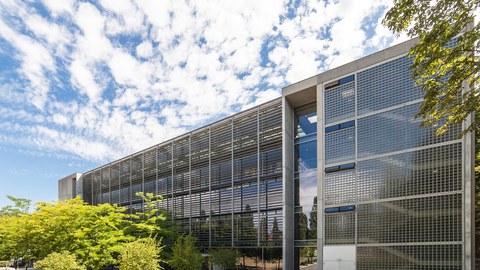Energy use at TU Dresden
Table of contents
Energy consumption at TU Dresden
With almost 40,000 students and staff, TU Dresden is one of the largest organizations in Dresden and as such has a correspondingly large energy consumption. TU Dresden’s annual environmental report contains detailed information on consumption rates at TU Dresden.
In line with our environmental guidelines, TU Dresden strives to use energy efficiently and economically (this comprises electricity, heating and cooling energy). At the same time, we will ensure that the necessary requirements for teaching, research and occupational safety are met to provide the best possible teaching and study conditions for all.
Details on resource consumption (electricity, district heating, gas and water), for instance for research projects or seminar papers, can be requested from the environmental coordination office.
Energy efficiency and climate protection activities
Despite an annual increase in the university's total area, TU Dresden's district heating consumption has remained unchanged for some time, and for some buildings, this figure has even declined. A number of older buildings have been renovated in recent years and some are currently under reconstruction. ERDF funding is also being used to improve energy efficiency. The waste heat from the high-performance computer (LZR) is being used to heat the Krone-Bau Building via local heating pipes. For new buildings or renovated buildings, we use energy-saving LED lighting. This said, TU Dresden’s buildings that are protected by historic preservation laws and the buildings which have not yet been renovated still pose particular challenges when it comes to energy conservation.
Various Environment Commission groups have also been working to improve regenerative energy production and climate protection at TU Dresden.
Greenhouse gas emissions and the use of renewable energies
Operations at TU Dresden entail direct and indirect emissions of CO2 and other other greenhouse gases. CO2 emissions have been dropping for several years. During a five-year period, the emissions fell by about 40% (about 20,000 t in 2020). This is mainly due to decreased CO2 emissions generated by electric utilities. The balance sheet does not yet include Scope 3 emissions (i.e. mobility and other upstream and downstream emissions). In the future, the greenhouse gas balance will be expanded and TU Dresden will begin moving towards climate-neutral operations.
Starting in 2023, TU Dresden will be supplied with green electricity by the Saxon State Real Estate and Construction Management (Staatsbetrieb Sächsisches Immobilien- und Baumanagement – SIB), which offers German Environment Agency guarantees of origin. So far, the Free State of Saxony has made available a total of seven building surfaces (roofs and façades) at TU Dresden for photovoltaic systems and operates these systems itself.
TU Dresden's sustainability strategy with a comprehensive action plan was adopted in the end of 2023. In addition to setting up a climate protection management system, the TU Dresden also aims to achieve greenhouse gas-neutrality (net-zero emissions) by 2035.

